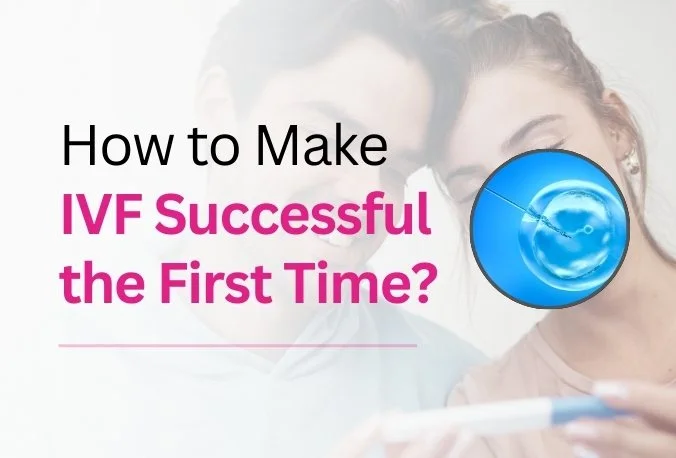How to Make IVF Successful the First Time?
– Published on 15 APRIL 2024

While IVF treatment offers great hope for getting pregnant, success is not guaranteed on the first try. The multiple steps involved and low success rates can add additional stress during an already challenging process. However, there are certain things patients can do to optimize their chances of a positive result the first time around.
In this post, we will explore evidence-based strategies for IVF patients seeking to maximize their likelihood of becoming pregnant on their initial round of in vitro fertilization.
Through diet, lifestyle changes, and selections made during the treatment planning process, those undergoing their first IVF cycle may be able to stack the odds more in their favor to avoid the emotional and financial toll of multiple failed cycles.
Are you trying to conceive? Let Dr. Samidha Dalvi-Amale, an experienced IVF specialist in Pune , guide you through IVF treatment and turn your dream of parenthood into reality.
IVF and its success rates
In Vitro Fertilisation (IVF) is a complex series of procedures used to treat fertility or genetic problems and assist with the conception of a child. During IVF, mature eggs are collected (retrieved) from the ovaries and fertilised by sperm in a lab. Then the fertilised egg (embryo) or eggs (embryos) are implanted in your uterus. One cycle of IVF takes about two weeks.
The success rates of IVF vary significantly and depend on a number of factors, including the age of the patient, the cause of infertility, and specifics of the treatment plan.
According to the Human Fertilisation and Embryology Authority (HFEA), the approximate chances of a successful IVF for women using their fresh eggs are 29% for women under 35, 23% for women aged 35 to 37, 15% for women aged 38 to 39, 9% for women aged 40 to 42, 3% for women aged 43 to 44 and 2% for women aged over 44. The use of donor eggs can potentially improve these rates.
It’s important to remember that each patient’s journey is unique, and these statistics only offer a broad overview.
Preparing Your Body for IVF
Preparing your body physically and emotionally for IVF is a crucial part of the process,and can potentially influence the treatment’s success.
Diet & Lifestyle:
Adhering to a balanced diet, rich in lean proteins, fruits, vegetables, and whole grains, is recommended. Certain studies suggest that a high protein, low carbohydrate diet can improve the chances of successful implantation and pregnancy. Additionally, maintaining a healthy weight can optimize the effectiveness of treatment.
Regular exercise is beneficial, but it’s advised not to overdo it. High-intensity workouts may be counterproductive, so focus on moderate activities such as walking, yoga, or swimming.
Mental Health:
The emotional stress of undergoing IVF can be substantial, so taking steps to manage stress and maintain positive mental health is essential. Some patients find counselling, meditation, or joining support groups beneficial in managing the emotional aspects of IVF.
Medical Preparations:
Prior to beginning IVF, certain medical preparations may be necessary. These might include discontinuing certain medications, adjusting existing treatment plans, and ensuring vaccinations are up-to-date. It’s essential to discuss these aspects in detail with your healthcare provider to ensure optimal preparation for the IVF process.
Every individual is unique, and what works best for one might not work for another. It’s crucial to have open, honest discussions with your fertility doctor about the best ways to prepare your body for IVF.
Improving Egg Quality
The quality of eggs is a crucial factor in IVF success and there are several steps that can be taken to improve it. A diet rich in antioxidants can help protect the eggs from oxidative stress. Foods like berries, spinach, nuts and seeds are all rich in antioxidants. Taking a daily prenatal vitamin, particularly one containing at least 400 micrograms of folic acid, can also promote egg health.
Lifestyle modifications that reduce stress levels can enhance overall health, including egg quality. Practices such as yoga, meditation, or other stress-reducing exercises can be beneficial.
Avoiding certain negative factors is also crucial – smoking and excessive alcohol intake can impact egg quality. Therefore, it is recommended to abstain from these habits when preparing for IVF. Lastly, regular consultation with your fertility doctor is vital in ensuring that any specific medical or dietary requirements are tailored to your individual needs to optimise egg health.
Managing Stress During the IVF Journey
Stress management throughout the IVF journey is of utmost importance, as excessive stress can impact both physical and emotional wellbeing. Several strategies can aid in managing stress during this time. Regular exercise, such as brisk walking or yoga, can release endorphins, which are known to alleviate stress. A balanced diet and adequate sleep contribute to maintaining overall health, which can directly influence stress levels.
Cognitive behavioural therapy (CBT) is also worth considering as it assists in altering thought patterns, helping individuals cope more effectively with stress and anxiety. It’s recommended to stay connected with a solid support network, be it friends, family or support groups – sharing experiences and feelings with others can lighten the emotional load.
Practising mindfulness and meditation can help anchor the mind in the present moment, reducing anxiety about future outcomes. Lastly, don’t hesitate to seek professional help if things get too overwhelming. It’s okay to ask for help, and there are many resources available to support you through your IVF journey.
Choosing the Right Fertility Clinic and Doctor
The choice of your fertility clinic and doctor plays a pivotal role in your IVF journey. A well-equipped clinic with state-of-the-art facilities and an experienced, compassionate medical team can make the process more efficient, less stressful, and enhance the chances of success. It’s vital to research prospective clinics, assessing their success rates, treatment options, and patient testimonials.
The doctor’s expertise and communication style should also be considered. It’s crucial to feel comfortable with your doctor, have trust in their knowledge, and feel confident that they listen to and understand your concerns. A good fertility doctor will personalise your treatment plan, taking into account your medical history, age, and lifestyle.
This is a journey that does not have to be walked alone. The right clinic and doctor can provide not only medical expertise but also emotional support throughout the process. Making well-informed decisions at the start of your IVF journey can contribute significantly to a more positive and potentially successful experience.
Post-IVF Care and Lifestyle Changes for a Successful Pregnancy
After the completion of an IVF cycle, it’s crucial to maintain a healthy lifestyle and follow proper post-IVF care to increase the chances of a successful pregnancy. Eating a balanced diet rich in fruits, vegetables, lean proteins, and whole grains can support your body and the developing embryo. Regular, mild exercise such as walking or yoga can help manage stress and maintain physical health, but it’s important not to overdo it.
Avoid any harmful substances such as tobacco and alcohol, as they can affect implantation and the development of the embryo. Stay hydrated and get plenty of sleep to ensure your body is at its best for potential pregnancy.
Your emotional well-being is equally important. It’s okay to feel a range of emotions during this waiting period. Reach out to your support network, turn to mindful practices, or seek professional help if needed.
Finally, follow your doctor’s instructions concerning medication and post-procedure care closely. Regular check-ups with your fertility doctor will ensure any potential concerns are addressed promptly, and any necessary adjustments to your treatment plan can be made. Making these lifestyle changes and prioritising self-care can greatly aid in achieving a successful pregnancy post-IVF.
In conclusion, the IVF journey is a marathon, not a sprint, and requires a remarkable degree of patience and positivity. The process can be emotionally and physically demanding, but maintaining an optimistic outlook can significantly impact your overall experience and potential success. It’s crucial to remember that self-care is not a luxury during this time, but an essential part of the journey.
Taking time to nourish your body, mind, and spirit will not only support your well-being but also create favourable conditions for a successful pregnancy. Each step, no matter how small, is progress.
Every journey begins with a single step, and your commitment to patience, positivity, and self-care is that first step towards welcoming the joy of parenthood. In case of any doubt or help required, please do not hesitate to get in touch with us, we will be more than happy to help you. Thank you!
Also read : Everything that you need to know about IVF

By Dr Samidha Dalvi-Amale
IVF and Fertility specialist Medical Director- Pune IVF
